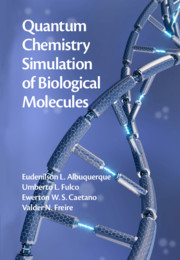Book contents
- Frontmatter
- Contents
- Preface
- Figure Credits
- 1 Basic Properties of Quantum Chemistry
- 2 Charge Transport in the DNA Molecule
- 3 Electronic Transmission Spectra of the DNA Molecule
- 4 Thermodynamic Properties of the DNA Molecule
- 5 Properties of the DNA/RNA Nucleobases
- 6 Molecular Electronics
- 7 Amino Acid Anhydrous Crystals
- 8 Protein–Protein Systems
- 9 Ascorbic Acid and Ibuprofen Drugs
- 10 Cholesterol-Lowering Drugs
- 11 Collagen-Based Biomaterials
- 12 Antimigraine Drugs
- 13 Antiparkinson Drugs
- 14 Central Nervous System Disorders
- 15 The Biology of Cancer
- 16 Concluding Remarks
- Bibliography
- Index
14 - Central Nervous System Disorders
Published online by Cambridge University Press: 21 January 2021
- Frontmatter
- Contents
- Preface
- Figure Credits
- 1 Basic Properties of Quantum Chemistry
- 2 Charge Transport in the DNA Molecule
- 3 Electronic Transmission Spectra of the DNA Molecule
- 4 Thermodynamic Properties of the DNA Molecule
- 5 Properties of the DNA/RNA Nucleobases
- 6 Molecular Electronics
- 7 Amino Acid Anhydrous Crystals
- 8 Protein–Protein Systems
- 9 Ascorbic Acid and Ibuprofen Drugs
- 10 Cholesterol-Lowering Drugs
- 11 Collagen-Based Biomaterials
- 12 Antimigraine Drugs
- 13 Antiparkinson Drugs
- 14 Central Nervous System Disorders
- 15 The Biology of Cancer
- 16 Concluding Remarks
- Bibliography
- Index
Summary
The administration of levodopa/carbidopa, prodrugs that cross the blood–brain barrier and are metabolized to dopamine in the central nervous system, remains the most effective treatment for Parkinson’s disease. The development of carrier systems to increase the rate of blood–brain barrier crossing has been a challenge. In particular, buckminsterfullerene C60 is promising, due to its ability to penetrate through the skin and the gastrointestinal tract. Aiming to give theoretical support to attempts in developing levodopa/carbidopa preparations for transdermal and oral administration looking for more continuous dopamine stimulation, we present a computational study of them adsorbed on C60 fullerene in the 2–8 pH range. We use classical and quantum simulations as our computational tools. Annealing calculations were performed to explore the space of their molecular configurations to obtain optimal geometries. A detailed interpretation of their harmonic vibrational frequencies are also presented, through the analysis of their Raman and infrared spectra.
Keywords
- Type
- Chapter
- Information
- Quantum Chemistry Simulation of Biological Molecules , pp. 331 - 345Publisher: Cambridge University PressPrint publication year: 2021

